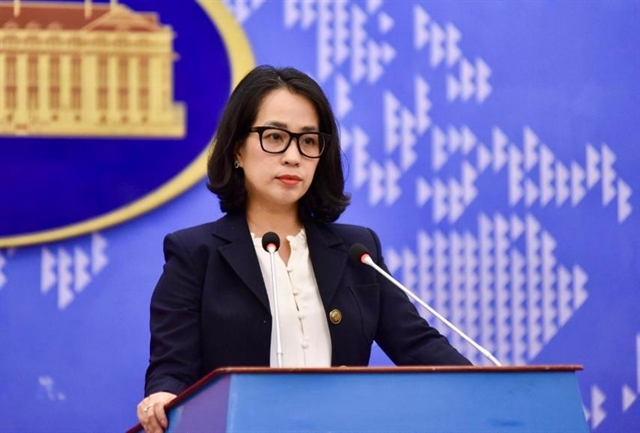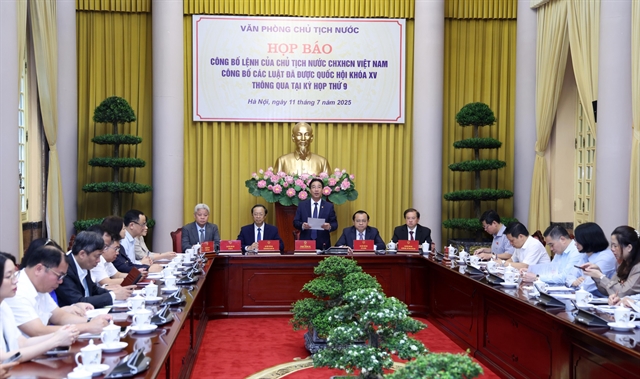 Politics & Law
Politics & Law

 |
| The Office of the State President holds a press conference to announce the President's order promulgating nine laws approved by the 15th National Assembly's 9th session. Photo chinhphu.vn |
HÀ NỘI — State President Lương Cường on Friday issued an order to promulgate nine newly adopted laws passed during the ninth sitting of the 15th National Assembly (NA), the Office of the President announced at a press conference.
The laws include wide-ranging reforms across education, taxation, labour, advertising, energy, chemicals and State-owned enterprise management. All but two will come into effect on January 1, 2026.
The nine laws are the Law on Teachers, the Law on Employment, the Law on Special Consumption Tax, the Law amending and supplementing several articles of the Law on Advertising, the Law on Chemicals, the Law on Management and Investment of State Capital in Enterprises, the Law on Corporate Income Tax, the Law amending and supplementing several articles of the Law on Economical and Efficient Use of Energy, and the Law on the State Budget.
Teachers’ salaries top public-sector pay scale
Introducing the Law on Teachers, Deputy Minister of Education and Training Phạm Ngọc Thưởng said that on June 16, the NA adopted the statute with 94.4 per cent of deputies present in favour. This is the first specialised act comprehensively defining the legal position, rights, obligations and policies for the more than one million teachers nationwide.
Comprising nine chapters and forty-two articles, and taking effect on January 1, 2026, the law focuses on five major policy groups: the definition of 'teacher'; standards and professional titles; implementation, incentives and working conditions; training, professional development and honouring of the profession; and State management roles.
For the first time, teachers in non-public institutions are recognised as members of a specific profession with equivalent standards, rights and duties, rather than merely contract employees. The statute affirms the pivotal role of teachers and broadens their rights to engage in scientific research, technology transfer and entrepreneurship.
It stipulates that teachers’ salaries will be placed at the highest level within the administrative and public-service pay tables, and adds allowances for hardship areas, housing, training, periodic health checks and incentives to attract high-quality personnel.
The law also merges the previous twin systems of 'professional-title ranks' and 'professional standards' into a single structure linking titles with competency standards, uniformly applicable to both public and non-public teachers.
Revised Law on Chemicals: more comprehensive, coherent and grounded in practice
Introducing the revised Law on Chemicals, Deputy Minister of Industry and Trade Trương Thanh Hoài said that on June 14, the NA adopted the statute with 99.3 per cent of deputies present voting in favour. Consisting of seven chapters and 48 articles, it will take effect on January 1, 2026, and represents a thorough overhaul of the 2007 Chemical Law.
The new law contains fresh provisions for formulating policies to develop the chemical industry into a modern, foundational sector; for managing chemicals consistently throughout their entire life cycle; for controlling hazardous chemicals contained in products; and for enhancing the effectiveness of chemical-safety assurance.
It has been framed to increase decentralisation and delegation of powers, simplify and cut administrative procedures, and maximise the application of information technology so as to improve the investment and business environment and facilitate enterprises during implementation.
In addition, the statute introduces appropriate transitional and commencement clauses to prevent regulatory gaps and minimise difficulties and obstacles for businesses.
The Law on Chemicals is a timely and substantive step towards fully institutionalising the Party’s guidelines and policies on sustainable development of the chemical industry, while also helping to safeguard national defence, security and public safety and to protect human life, property and the environment.
Law on Employment: substantive reforms, broader coverage
Deputy Minister of Home Affairs Nguyễn Mạnh Khương said that on June 16, the NA passed the Employment Law 74/2025/QH15. The law comprises eight chapters with 55 articles and will take effect on January 1, 2026.
The statute embodies the Party’s policy to perfect the institutional framework and remove what it calls the “bottleneck of bottlenecks”. It ensures internal legal consistency, aligns with Việt Nam’s international commitments and is expected to energise the labour market and secure sustainable employment for all workers.
The 2025 Employment Law establishes policies on job‑creation support, labour registration, the labour‑market information system, skills development, employment services, unemployment insurance and State management of employment. It applies to every Vietnamese citizen aged at least 15 years old who is able and willing to work, including employees with labour contracts, workers without labour contracts and unemployed persons.
Building on provisions that have proved effective since the 2013 act, the new law revises outdated rules and, crucially, adds measures to institutionalise four breakthrough resolutions – the 'four pillars' guiding the country into a new era.
Law on Special Consumption Tax: broader scope and rate adjustments
Deputy Minister of Finance Lê Tấn Cận said the revised Special Consumption Tax Law contains four chapters with 11 articles and will enter into force on January 1, 2026. Compared with the current statute, the 2025 revision introduces several important changes.
Regarding taxable items, aside from the goods and services already subject to special consumption tax, the law now adds soft drinks that meet the national standard for sugar content above five grammes per 100 millilitres. Air conditioners with a capacity from 24,001 to 90,000 BTU are also newly taxed, replacing the previous ceiling of 90,000 BTU. The schedules for tobacco, alcohol, beer, automobiles, aircraft and other items have been updated to align with specialised regulations.
As for non‑taxable objects, the revised law exempts goods produced or processed for direct export or sold under entrustment for export. It also extends exemptions to aircraft, helicopters, gliders and yachts used for commercial freight or passenger transport or tourism, as well as those employed for national defence, security, medical evacuation, rescue, firefighting, pilot training, filming, photography, cartography or agricultural production. Passenger cars and four‑wheel passenger vehicles that are not road‑registered and operate solely within amusement parks, sports complexes, historical sites, hospitals or schools are likewise exempt.
These amendments broaden the taxable base while refining exemptions to facilitate legitimate business activities and ensure consistency with related sectoral laws.
Advertising Law: tightening online ads, enhancing transparency
Deputy Minister of Culture, Sports and Tourism Tạ Quang Đông said the statute amending and supplementing several articles of the Advertising Law comprises three articles and will take effect on January 1, 2026. It was drafted with an innovative legislative mindset to meet the country’s development needs in the new era.
The NA has authorised the Government to issue detailed regulations and guidance on emerging and rapidly evolving matters, minimise new administrative procedures, facilitate citizens and businesses and modernise advertising management practices, especially for online and cross‑border campaigns.
Key breakthrough provisions expand the rights and duties of entities that transmit advertisements, tighten rules on the use of the Vietnamese language in advertising products and set clearer requirements for advertising content and conditions. They also refine regulations for advertising on radio, television, the internet and outdoor media, aiming to ensure greater transparency and consumer protection.
Law on Management and Investment of State Capital in Enterprises: greater autonomy, fewer procedures
Deputy Minister of Finance Lê Tấn Cận said the Law on Management and Investment of State Capital in Enterprises will take effect on August 1, 2025. The statute comprises eight chapters with 59 articles, preserving provisions that remain appropriate while amending and supplementing others to fully institutionalise Party policy on restructuring State‑owned enterprises, controlling power and stimulating innovation and digital transformation.
The revised law governs both the State’s investment of capital in enterprises and the management of that capital once invested. It no longer uses the phrases “use of State capital for production and business” or “supervision of State capital in enterprises” found in Law 69/2014/QH13, because “management of State capital in enterprises” now implicitly covers both usage and oversight. Select provisions of the 2014 law have been retained where effective.
The act clearly identifies its scope of application. It covers State‑owned enterprises under the Enterprise Law, and credit institutions in which the State holds more than 50 per cent of charter capital under the Law on Credit Institutions, excluding policy banks. Thus the statute is no longer limited to firms in which the State owns 100 per cent of capital, as was the case under Law 69/2014/QH13.
An implementation clause also allows political organisations, the Việt Nam Fatherland Front and its member groups to apply the law when managing and investing their funds in enterprises, thereby providing a legal foundation for their investment and capital‑management activities.
Overall, the law reduces administrative procedures, increases enterprise autonomy and clarifies responsibilities, thereby supporting more efficient use of State capital and encouraging innovation and digital transformation in the State‑owned sector.
Law on Corporate Income Tax: broader taxable base and targeted incentives
Deputy Minister of Finance Lê Tấn Cận noted that the new Corporate Income Tax Law comprises four chapters and 20 articles. It will take effect on October 1, 2025, and applies from the 2025 corporate income‑tax period. The statute translates Party and Government directions on tax reform into binding regulations, ensuring coherence with related legislation on investment, enterprises, science and technology, innovation, digital transformation and the digital economy.
Compared with the current law, the 2025 act introduces several changes. It clarifies the definition of taxpayers and taxable income, revises the list of tax‑exempt income and refines rules on tax periods, the determination of taxable income and calculation methods. New provisions spell out which expenses may or may not be deducted when computing taxable profits. They also adjust rates and provide targeted incentives to encourage technological innovation, sustainable development and regional development priorities. These measures aim to reduce compliance costs for enterprises while supporting the country’s strategic economic goals.
Law on Economical and Efficient Use of Energy: more incentives, simpler procedures
Deputy Minister of Industry and Trade Trương Thanh Hoài said the amendment to the Law on Economical and Efficient Use of Energy consists of two articles and will come into force on January 1, 2026. The revision centres on four policy areas.
First, it strengthens State management by sharpening regulations on planning, inspection and enforcement. Second, it supports the growth of energy‑efficiency consulting, energy auditing and workforce training through clearer licensing rules and professional standards. Third, it introduces incentive policies and financial instruments, such as concessional loans and tax benefits, to encourage investment in energy‑saving projects and technologies. Finally, it updates market mechanisms and performance requirements for energy‑consuming equipment and vehicles, thereby guiding the transition towards higher‑efficiency products.
State Budget Law: greater decentralisation and accountability
Deputy Minister Lê Tấn Cận also presented the State Budget Law, which contains seven chapters and 79 articles and will apply from the 2026 budget year. The law restructures the division of revenue sources and spending responsibilities, maintaining the leading role of the central budget while increasing the autonomy of local budgets. It delineates the powers and duties of each level of government under the principle that tasks should be assigned to the tier capable of performing them most efficiently.
The act enhances parliamentary and People’s Council oversight, simplifies budgetary procedures and promotes transparency, thrift and accountability. It replaces the 2015 State Budget Law and its later amendments.
Three transition arrangements take effect on July 1. They cover the decentralisation of spending assignments between provincial and communal budgets for science, technology, innovation and digital transformation; the preparation and allocation of budget estimates for those fields; and temporary budget advances. These interim measures ensure a smooth shift to the new framework while supporting the national drive for innovation and digital government. VNS




